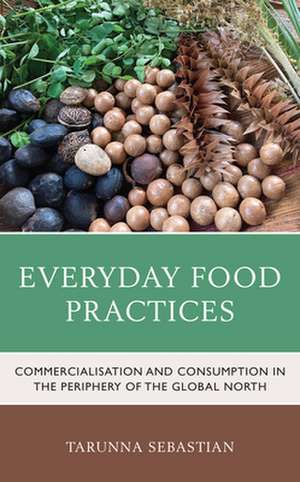Everyday Food Practices: Anthropology of Well-Being: Individual, Community, Society
Autor Tarunna Sebastianen Limba Engleză Hardback – 28 iun 2021
Din seria Anthropology of Well-Being: Individual, Community, Society
- 23%
 Preț: 608.28 lei
Preț: 608.28 lei - 27%
 Preț: 686.05 lei
Preț: 686.05 lei -
 Preț: 416.33 lei
Preț: 416.33 lei - 23%
 Preț: 651.01 lei
Preț: 651.01 lei -
 Preț: 352.62 lei
Preț: 352.62 lei - 23%
 Preț: 687.04 lei
Preț: 687.04 lei -
 Preț: 360.63 lei
Preț: 360.63 lei - 23%
 Preț: 606.81 lei
Preț: 606.81 lei - 23%
 Preț: 650.72 lei
Preț: 650.72 lei -
 Preț: 307.24 lei
Preț: 307.24 lei - 5%
 Preț: 720.76 lei
Preț: 720.76 lei -
 Preț: 402.29 lei
Preț: 402.29 lei - 23%
 Preț: 651.32 lei
Preț: 651.32 lei -
 Preț: 307.20 lei
Preț: 307.20 lei - 23%
 Preț: 558.34 lei
Preț: 558.34 lei - 23%
 Preț: 587.17 lei
Preț: 587.17 lei - 27%
 Preț: 890.00 lei
Preț: 890.00 lei - 23%
 Preț: 586.89 lei
Preț: 586.89 lei - 23%
 Preț: 685.56 lei
Preț: 685.56 lei - 23%
 Preț: 586.04 lei
Preț: 586.04 lei - 23%
 Preț: 589.24 lei
Preț: 589.24 lei - 23%
 Preț: 647.33 lei
Preț: 647.33 lei -
 Preț: 307.97 lei
Preț: 307.97 lei - 27%
 Preț: 678.55 lei
Preț: 678.55 lei
Preț: 650.27 lei
Preț vechi: 844.50 lei
-23% Nou
Puncte Express: 975
Preț estimativ în valută:
124.44€ • 135.13$ • 104.53£
124.44€ • 135.13$ • 104.53£
Carte tipărită la comandă
Livrare economică 22 aprilie-06 mai
Preluare comenzi: 021 569.72.76
Specificații
ISBN-13: 9781793630360
ISBN-10: 1793630364
Pagini: 236
Dimensiuni: 152 x 229 x 21 mm
Greutate: 0.48 kg
Editura: Rowman & Littlefield
Seria Anthropology of Well-Being: Individual, Community, Society
ISBN-10: 1793630364
Pagini: 236
Dimensiuni: 152 x 229 x 21 mm
Greutate: 0.48 kg
Editura: Rowman & Littlefield
Seria Anthropology of Well-Being: Individual, Community, Society
Notă biografică
Descriere
In Everyday Food Practices, Tarunna Sebastian examines the everyday food journeys of people in diverse metropolitan communities. Sebastian investigates how food knowledge and education inform food choices and are influenced by the media, social and familial interaction, globalised food retailers, and alternative food networks.
